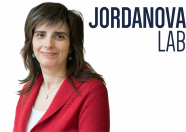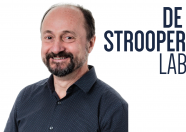Taking HDAC6 drugs from the lab to the clinic with Augustine Tx

Taking HDAC6 drugs from the lab to the clinic with Augustine Tx
The road that links basic research to the development and commercialization of life-changing therapies can be a long one. In the case of Charcot-Marie-Tooth disease (CMT), every single day counts. This debilitating illness is driven by the degeneration of peripheral nerve axons, causing muscle weakness, foot deformities and sensory abnormalities.
Thanks to the pioneering research of scientists at the VIB-KU Leuven Center for Brain & Disease Research and the creation of VIB spin-off Augustine Therapeutics in 2019, there is a promising light at the end of the tunnel for CMT and neuropathy patients with unmet medical needs.
Rewind a decade, when the lab of Professor Ludo Van Den Bosch, one of the world’s leading experts in neurodegeneration made an interesting discovery on CMT disease – the most commonly inherited neurological disorder.
Van Den Bosch's lab was exploring the mechanisms that cause neuronal degeneration – specifically of motor and sensory axons caused by mutations in the HSPB1 gene. During the PhD research of a former student, the team uncovered that inhibiting histone deacetylase 6 (HDAC6), an enzyme that regulates key processes in nerve axons, can reverse the loss of axons in a CMT mouse model.
Building on this finding, the research team demonstrated that inhibiting HDAC6 also offers promising therapeutic potential for other types of CMT, as well as for other illnesses caused by damage to nerves located outside of the brain and spinal cord.
The innovators


From patient to researcher
It was at this point that PhD student Rob Prior entered the scene back in late 2015. "A form of CMT runs in my family," the 29-year-old Irish native explains. "My mother is in a wheelchair and a few of my aunts and cousins are severely affected too. So, being a CMT patient myself, I already knew I wanted to be involved in CMT research when I was only sixteen.
"During my undergraduate and MSc studies in Ireland, I followed the progress of every CMT lab in Europe and the US – there aren’t actually that many. None of them had a major breakthrough on the horizon in terms of therapeutic targets until the Van Den Bosch lab revealed its ground-breaking insights. As soon as I heard about that, I knew I had to get myself over to Belgium.
"I work on several projects in the Van Den Bosch lab. We use a number of CMT mouse models, but my main focus lies on better modelling the illness using induced pluripotent stem cells from actual patients and evaluating potential therapies. One research track is concentrated on whether HDAC6 inhibition can be used to treat different CMT variants – including the one present in my family tree. Understanding the molecular pathogenic mechanisms in patient cells and developing reliable disease-related cellular models enable us to develop screening and therapeutic opportunities."
From lab to start-up
Once the basic researchers at VIB had clearly established the potential of HDAC6 inhibition to treat not just CMT but other neuropathies as well, Ludo got in touch with Laurent Galibert of the VIB Discovery Sciences team. This was the starting point of the translational science process.
“Translational science is our playing field at VIB Discovery Sciences," Galibert explains. "We bridge the academic world of discovery and the impact-driven world of industry in order to develop drugs and innovations with potentially huge societal benefits. We like to think of ourselves as ‘bilingual’, speaking the languages of academia and business.
“Our goal here was to take the scientific breakthroughs made by the Van Den Bosch lab and translate them into a viable drug discovery project with a competitive edge,” Galibert continues. “We defined all the parameters of this endeavor, composed a project team, and defined the characteristics of the products resulting from our effort and potential funding avenues.”



From start-up to patient?
After a successful seed capital round generating 4.2 million euros, Augustine Therapeutics was founded in December 2019. In March 2021, Dr Sylvain Celanire was appointed as CEO and new labs were opened at the Bio-Incubator in Leuven. "Both moves serve the same goal: to guide Augustine Therapeutics towards approved therapies for patients in need as soon as possible," Sylvain explains. “The additional funding we received from the Flanders Agency for Innovation & Entrepreneurship in 2021 is not only an excellent boost for our innovative research towards first-in-class medicines. It's also an external validation of the quality and importance of our pioneering work. We're taking big steps to provide safe and effective solutions for CMT patients."
Rob Prior is very confident about the future: "I'm delighted to see Augustine Therapeutics is going really well. The therapies our spin-off is working on have a chance of being very effective in treating CMT as well as other diseases. Personally, I know I'll always be involved in CMT research. I can't see myself doing anything else. Developing new models, evaluating therapies, reaching out to patient organizations… I'm ready to do anything I can to help accelerate CMT research and treatment development."
Faces of VIB's research
Other VIB labs perform research on CMT or have made discoveries that contributed to the foundation of spin-off Augustine Therapeutics.









